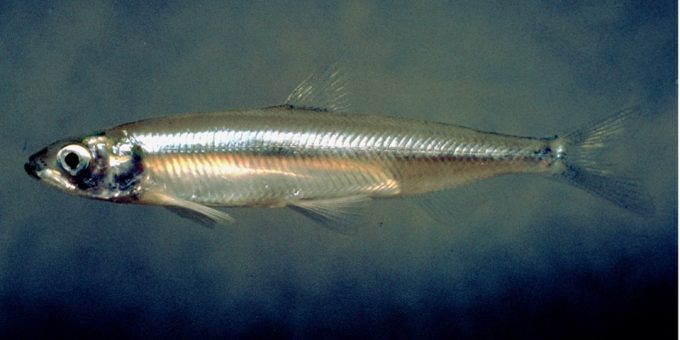
Photo: U.S. Fish and Wildlife Service
That Tiny, Tiny Little Fish
During a recent interview with conservative commentator Hugh Hewitt, former president Donald Trump weighed in on California water policy. Trump lamented that the state had rejected his proposal to redirect water “down from the north” because its Democratic leaders were “trying to protect a tiny, tiny little fish.”
The “tiny little fish” in question was the Delta Smelt, an endangered species found only in the northeastern part of the San Francisco Bay. Though Trump’s political opponents were quick to paint the above statement as a “confused rant,” it wasn’t the first time Trump had taken issue with this little fish. In 2020, Trump complained to Sean Hannity of Fox News that California had to “ration” water because the state was pouring its supply into the sea to “take care of certain little tiny fish.” And back in 2016, then-candidate Trump cited protections of a “certain kind of three-inch fish” to argue that there was “no drought” in California (which was experiencing the height of the region’s worst megadrought in 1,200 years).Conservatives have lodged other fishy complaints against the Delta Smelt. Hannity devoted an entire episode of his popular primetime television show to this tiny fish, attributing “incredible suffering” to the government’s decision to “put the interest of a two-inch Delta Smelt… before the people of California.” Sarah Palin summed up her feelings about the Delta Smelt as follows: “Where I come from, a three-inch fish, we call that bait. There is no need to destroy people’s lives over bait.”
Why the big fuss about this tiny fish? According to the dominant journalistic framing, the species is politically explosive because California’s limited water supply is a zero-sum game: more water for the Smelt means less water for the people of California. Yet my research reveals the limits of this explanation, demonstrating that the Delta Smelt controversy is better explained by national partisan divisions than by a regional water struggle.
In a study recently published in the American Journal of Cultural Sociology, I combine quantitative analyses of hydrological data and measures of social interest in the Delta Smelt with the qualitative analysis of 1,256 opinion articles to show that conflicts over the distribution of water fail to explain how this tiny fish gained such heightened political salience. Rather, strategic actors that I call “division entrepreneurs”—in this case, right-wing elites at the intersection of partisan media and electoral politics—have opportunistically seized on the Delta Smelt and strategically mobilized it as a divisive issue in an already polarized public sphere.
The Delta Smelt’s controversial status, that is, has less to do with its (modest) effects on water policy than with its potent symbolism for all that is supposedly wrong with California, liberals, and environmentalism on the national political stage. Negative opinion articles about the Delta Smelt were disproportionately published in media outlets targeting audiences outside of California (the only state affected by water regulations protecting the Delta Smelt) and were often embedded in discussions of hot-button partisan issues completely unrelated to water regulations, such as abortion and LGBTQ+ rights. Thus, the Smelt became an effective political tool for division entrepreneurs to foster resentment toward California’s leaders, policies, and liberal-leaning populace, regardless of whether any water regulations protecting the species had taken effect in a given year.Still, one might wonder why conservative leaders have directed so much vitriol toward the Delta Smelt specifically when it is not the only endangered species that affects the flow of water to California’s farms and cities. After all, the practical implications of protecting Chinook salmon and the Delta Smelt are virtually indistinguishable. I found that when voicing opposition to environmental protections, opinion writers were much more likely to mention the Delta Smelt in isolation, conveniently ignoring the plight of its larger and more majestic cousin (writers in favor of protecting the Delta Smelt, on the other hand, tend to mention the two species together). The contrasting reactions to the two fish, and the frequent usage of descriptors like “tiny” or “little,” suggest that the Delta Smelt’s small size and lack of charisma made it the perfect icon to drum up right-wing resentment, allowing it to become a divisive cultural object, or what I call a “wedge.”
From a water policy perspective, conservative politicians and pundits’ fixation on the Delta Smelt makes little sense. But understood through a political lens, the fish focus is anything but “confused.” Right-wing elites’ repeated invocations of the Delta Smelt communicate the often implicit, but politically powerful message that “they” (in this case, liberal environmentalists in faraway cities) care less about “you” (ordinary hardworking Americans) than a tiny fish.
Understanding the politicization of the Delta Smelt can help us make sense of other political divisions over the natural environment and other social problems. Many disagreements that appear to be about something quite material, concrete, or scientific—for example, water, energy, or climate change—hinge instead on emotionally evocative stories that help pit “us” against “them.” Knowing this, there is power in refusing to take the bait.
Caleb Scoville is in the Department of Sociology at Tufts University. He studies the politics of environmental knowledge and the dynamics of environmental controversies.
